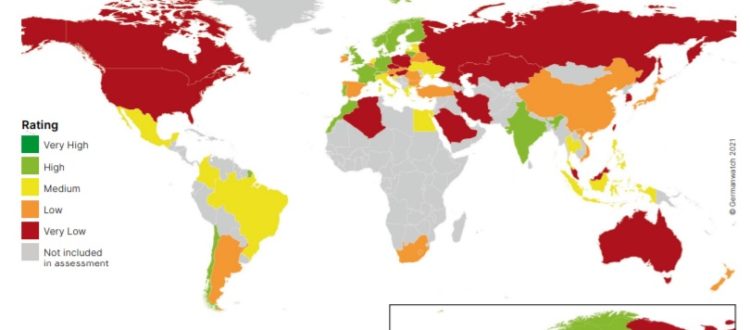NATIONAL COMMITMENTS: A RANKING
On the sidelines of negotiations at the Glasgow Conference, the NGO Germanwatch presented the results of its latest Climate Change Performance Index (CCPI) at a press conference. This is an independent report that the organization has published every year since 2005, in which a team of 450 experts analyze the climate progress of 63 countries plus the European Union, together responsible for 92% of global greenhouse gas emissions.
The final assessment is calculated on the basis of the scores obtained in four main categories: greenhouse gas emissions, which are the most important aspect and weigh 40% of the score; climate policies (20%); energy consumption (20%); renewable energies (20%). Ratings can be as follows: very high, high, medium, low, very low.
The index’s aim is to increase transparency in international politics and try to push for greater ambition. A tool like this, independent and with a significant international following, can stimulate political debate outside and inside the countries involved. The purpose is more than urgent: as the analysis confirms, the commitments of countries are still far from guaranteeing an average global warming scenario within +1.5°C.
None of the countries analyzed, in fact, obtained a high score in all categories and, consequently, the maximum global assessment (very high) in the CCPI. Therefore, as in previous years, the first three positions in the ranking remain empty, demonstrating that even the top ranked countries are not doing everything necessary to ensure a +1.5°C scenario.
In the first (available) place, the 4th, we find Denmark: to be praised the promise not to start new oil and gas extraction activities, and to stop the current production by 2050 (Denmark is also the promoter, together with Costa Rica, of the Beyond Oil & Gas Alliance that intends to spur other countries to follow in its footsteps). The share of energy produced through renewable sources is also considerable, 50% (with a clear prevalence of wind power).
The United Kingdom, host of COP26, dropped two positions to 7th place, but still remains among the top ten thanks to its goal of achieving zero net emissions by 2050 and its new interim commitment to decarbonize the energy sector by 2035, as well as the share of energy produced from renewable sources (40%, mainly offshore wind). Also crucial is the promise to phase out coal-fired power plants by 2024.
The European Union lost six positions and dropped to 22nd place despite the new interim target of a 55% reduction in emissions by 2030 (compared to 1990 levels). In fact, the analysis takes into account the inadequate progress made by some Member States, such as Poland and the Czech Republic, which individually obtained the lowest rating (very low).
China, on the other hand, has obtained an evaluation that is perhaps better than expected, even though the score is low, coming in at 37th place. In fact, despite obtaining the worst score in the “greenhouse gas emissions” category (as expected), it was awarded a high score in the “climate policies” category. According to CCPI experts, China’s policies are ambitious, with the goal of reaching peak emissions by 2030 and climate neutrality by 2060, although its current target for 2030 is not consistent with the +1.5°C target nor with the +2°C target.
Among the bottom of the class is Australia (58th place out of 64): the analysis confirms the country’s lack of commitment to mitigation policies. Australia is the second largest coal exporter in the world and has not yet announced any plan to abandon coal mining, so much so that its recent commitment to zero emissions by 2050 seems an empty promise.
One aspect to take into account when evaluating countries’ policies is their historical commitment: Nordic nations are always among the front-runners because they started implementing mitigation policies some time ago. This reminds us that there can be “traps” in the emission reduction targets of the NDCs, given the vagueness of deadlines such as “by 2050”: a country could proceed with indolence for 15 years and then concentrate all efforts to reach its target in the last 5, reasoning that is obviously not compatible with a 1.5°C scenario, given the cumulative emissions in the atmosphere.
What about Italy? Our country continues to receive a mediocre evaluation (medium). In particular, the recent Recovery and Resilience Plan (PNRR) is not considered ambitious enough, with an emissions reduction target of 51% by 2030, not yet compatible with the EU target of 55% (which, in turn, would not be enough to guarantee a +1.5°C scenario). It also criticizes the decision to fall back on gas-fired plants to make up for the abandonment of coal by 2025, instead of increasing the share of renewables more rapidly. However, the allocation of 70 billion euros in funding for the ecological transition is welcomed.
Responding to journalists’ questions, the CCPI analysts also gave their opinion on the progress of COP26 and were confident that this conference seems – at least in words – to finally address the issue of abandoning fossil fuels.
Experts also commented on the recent statement by the executive director of the International Energy Agency, Fatih Birol, that the latest commitments announced at the Glasgow COP translate for the first time into a 50% chance of limiting global warming to within +1.8°C.
The good news should be taken with caution, however, because it remains to be seen whether countries will be able to deliver on the commitments announced.
As Climate Analytics also pointed out, the hypothetical +1.8°C scenario is mainly the result of the net zero targets announced for 2050 and beyond. As already mentioned, there is still a huge gap to be bridged to make the intermediate 2030 targets compatible (i.e. a reduction in emissions by 2030 such as to make it scientifically and economically possible to achieve climate neutrality by 2050). Let’s not forget that a 50% probability of staying within +1.8°C is still far from being a very high probability.
by Teresa Giuffrè, Italian Climate Network Volunteer at COP26
You are reading this ICN COP Bulletin article as part of the EC DEAR SPARK project. Marirosa Iannelli, Coordinator of the Climate & Advocacy Department of ICN, overviews this activity. ICN monitors negotiations and reports what is happening in Italian and English, on our website and on social channels, as part of a pan-European consortium of over 20 non-profit organizations committed to promoting climate awareness with particular attention to the role of young people and issues related to international cooperation and gender policies.


